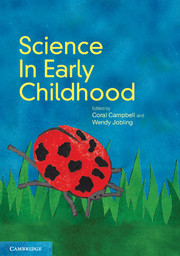Book contents
- Frontmatter
- Contents
- Contributors
- INTRODUCTION
- CHAPTER 1 SCIENCE IN THE NATIONAL EARLY YEARS LEARNING FRAMEWORK
- CHAPTER 2 LEARNING THEORIES RELATED TO EARLY CHILDHOOD SCIENCE EDUCATION
- CHAPTER 3 USING PLAY PEDAGOGY IN THE EARLY YEARS
- CHAPTER 4 TEACHING APPROACHES
- CHAPTER 5 DEVELOPING PEDAGOGICAL PRACTICES FOR SCIENCE TEACHING AND LEARNING WITH 3 AND 4-YEAR-OLD CHILDREN
- CHAPTER 6 EFFECTIVE SCIENCE LEARNING ENVIRONMENTS
- CHAPTER 7 LEARNING SCIENCE IN INFORMAL CONTEXTS: THE HOME AND COMMUNITY
- CHAPTER 8 ENVIRONMENTAL EDUCATION FOR SUSTAINABILITY AND ITS PLACE WITHIN SCIENCE
- CHAPTER 9 CATERING FOR CHILDREN'S DIFFERING NEEDS IN EARLY CHILDHOOD SCIENCE EDUCATION
- CHAPTER 10 PLANNING FOR SCIENCE
- CHAPTER 11 OBSERVING, ASSESSING AND DOCUMENTING LEARNING IN SCIENCE
- CHAPTER 12 PROFESSIONAL LEARNING – REFLECTIVE PRACTICE IN SCIENCE EDUCATION
- Additional resources
- Appendix
- Glossary
- Index
CHAPTER 7 - LEARNING SCIENCE IN INFORMAL CONTEXTS: THE HOME AND COMMUNITY
- Frontmatter
- Contents
- Contributors
- INTRODUCTION
- CHAPTER 1 SCIENCE IN THE NATIONAL EARLY YEARS LEARNING FRAMEWORK
- CHAPTER 2 LEARNING THEORIES RELATED TO EARLY CHILDHOOD SCIENCE EDUCATION
- CHAPTER 3 USING PLAY PEDAGOGY IN THE EARLY YEARS
- CHAPTER 4 TEACHING APPROACHES
- CHAPTER 5 DEVELOPING PEDAGOGICAL PRACTICES FOR SCIENCE TEACHING AND LEARNING WITH 3 AND 4-YEAR-OLD CHILDREN
- CHAPTER 6 EFFECTIVE SCIENCE LEARNING ENVIRONMENTS
- CHAPTER 7 LEARNING SCIENCE IN INFORMAL CONTEXTS: THE HOME AND COMMUNITY
- CHAPTER 8 ENVIRONMENTAL EDUCATION FOR SUSTAINABILITY AND ITS PLACE WITHIN SCIENCE
- CHAPTER 9 CATERING FOR CHILDREN'S DIFFERING NEEDS IN EARLY CHILDHOOD SCIENCE EDUCATION
- CHAPTER 10 PLANNING FOR SCIENCE
- CHAPTER 11 OBSERVING, ASSESSING AND DOCUMENTING LEARNING IN SCIENCE
- CHAPTER 12 PROFESSIONAL LEARNING – REFLECTIVE PRACTICE IN SCIENCE EDUCATION
- Additional resources
- Appendix
- Glossary
- Index
Summary
Objectives
At the end of this chapter, you will:
Reflect on background research on science learning in the home and community.
Recognise the multiplicity of ways in which science skills and concepts are developed within the everyday practices of families.
Reflect on case studies and practical tasks on science learning in the home and the community.
Be able to relate the EYLF to how families' funds of knowledge can provide a rich and meaningful basis for children's learning in science.
Recognise how important it is for teachers to make connections between the everyday concepts that children develop in these informal settings and scientific or academic concepts.
Overview
Science is everywhere. Learning about science occurs not only in formal school settings, but also in home and community contexts. Informed by sociocultural theory, this chapter examines some of the multiple and complex ways in which science skills and concepts are being developed within the everyday practices of families, and ways in which families' funds of knowledge provide a rich and meaningful basis for children's future learning in science. The chapter argues that it is important for teachers to make connections between the everyday concepts that children develop in these informal settings and the scientific or academic concepts they are introduced to in pre-school or school.
From birth children are connected to family, community, culture and place. Their earliest development and learning takes place through these relationships, particularly within families, who are children's first and most influential educators (Department of Education, Employment and Workplace Relations [DEEWR], 2009, p. 7).
- Type
- Chapter
- Information
- Science in Early Childhood , pp. 94 - 112Publisher: Cambridge University PressPrint publication year: 2012



